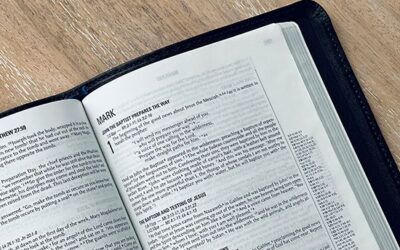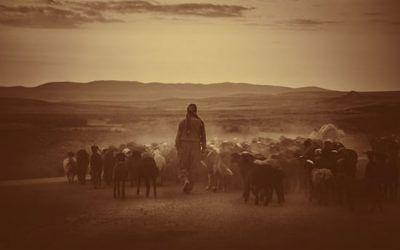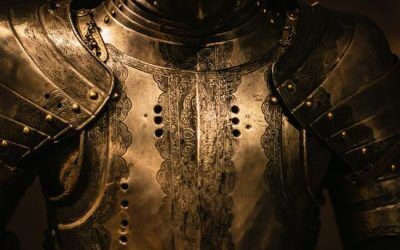“Simon the Zealot” was one of the 12 disciples chosen by Jesus Christ.
But despite this important role, the New Testament doesn’t provide specific details about his life, family, job, etc. While being called a “zealot” might offer some insight into his character, using this description without further clarification actually leaves us with more questions than answers.
So here we will look at which details about Simon are documented, what we can infer from theories and social or historical cues, and how we can sum up his legacy as an apostle.
We’ll cover:
Let’s start with the basic background information we do know from Scripture.
Who was Simon the Zealot?
As we mentioned earlier, Simon the Zealot was one of Jesus’ 12 disciples.
The fact that Simon was chosen as a disciple is pretty significant on its own. Although, it’s just about the only thing the Bible tells us about him, as the Bible only mentions him by name when it lists him among the other disciples:
“The names of the twelve apostles are these: first, Simon, who is called Peter, and Andrew his brother; James the son of Zebedee, and John his brother; Philip and Bartholomew; Thomas and Matthew the tax collector; James the son of Alphaeus, and Thaddaeus; Simon the Zealot, and Judas Iscariot, who betrayed him.” (Matthew 10:2-4, ESV).
Any other ideas about this Simon come from extra-biblical sources. These sources include various stories of “church tradition,” Bible scholars, and modern media that have attempted to fill in the gaps of what we know about this mysterious figure.
One of the most recent attempts to explore the life of Simon comes from the hit series on Netflix, The Chosen.
The show explores what the Bible might have meant in calling Simon a zealot, and how Simon might have come to put his life of zealotry behind him to follow Christ. (It even goes so far as to say that Simon is related to the paralyzed man at the pool of Bethesda).
Though The Chosen’s portrayal of Simon gives us an interesting take on Simon’s struggles, the Bible doesn’t say anything about the problems he dealt with. (And it doesn’t say anything about him having a brother named Jesse either.1)
He is only ever mentioned four times. In each mention, he is only described as being one of the 12 disciples (Luke 6:12-16; Matthew 10:2-4; Mark 3:13-19; Acts 1:13).
And we want to make sure he isn’t to be confused with the other Simons of the Bible, of which there are many, including:2
- Simon Peter, one of Jesus’ most well-known disciples (Matthew 4:18)
- Simon, the brother of Jesus (Mark 6:3)
- Simon, a leper (Mark 14:3)
- Simon, a tanner (Acts 9:43)
- Simon, a man who carried Jesus’ cross (Matthew 27:32)
- Simon, the father of Judas Iscariot (John 6:71)
Alongside Jude, or Thaddeus, and James of Alphaeus, Simon the Zealot is one of the least known disciples.
But even though the Bible doesn’t tell us much about Simon, that doesn’t mean he didn’t do amazing things for Christ.
Was Simon really a zealot?
There’s some confusion surrounding what the Bible means by calling Simon a zealot.
First off, there’s some disagreement among scholars about whether Simon should be called a zealot at all.
The Gospel according to Luke uses the Greek word zēlōtēs, meaning zealot, to describe Simon.3 The Gospel accounts of Matthew and Mark, on the other hand, use the word kananaios.4
Old Bible scholars like Eusebius, otherwise known as Saint Jerome, believed this word was another term for a Cananaean or a Canaanite.5 This is why you see some of the older translations like the King James Version and the New King James Version referring to Simon as Simon the Canaanite.6
But modern scholars believe that Eusebius’ understanding of the word was actually a mistranslation.7 They believe kananaios is related to the word qan’an, which means “zealous one” in Aramaic.8 This is why a lot of newer translations refer to Simon as a zealot.9
Now, the word zealot could also refer to many different things.
The word zealot is generally defined as, “a person who has very strong feelings about something (such as religion or politics) and who wants other people to have those feelings.”10
Because the Bible doesn’t specify what Simon was zealous about, we’re left to guess.
He could have been a zealot in his dedication to follow Christ. Or he could have been like the Pharisees in his dedication to the Mosaic law.11
But, many scholars believe the use of this word suggests that Simon was actually a part of a radical group of Jewish freedom fighters called the Zealots.12
The Zealots were suspicious of any authority figure, as they saw God as their one and only ruler.13 That’s why, when the Roman Empire came along and conquered Israel, the Zealots weren’t happy. They decided to do whatever they could to undermine and resist Roman rule.
Many Jews shared the Zealots’ loathing for Roman occupation. Many of them hoped the Messiah would come to overthrow their Roman oppressors.14
But while many Jews prayed for Messianic intervention, the Zealots took their opposition to Rome to more extreme measures.
They attacked Roman officials and civilians alike. An offshoot group known as the Sicarri were even known to attack fellow Jews they suspected of being sympathetic to Rome.15
Eventually, the Zealots were able to temporarily overthrow Roman control over Jerusalem in the first Jewish revolt.16
Josephus, a Jewish historian, recorded the year the Zealots became an organized group.
Although, notably, his records do have some inconsistencies.
In one account, Josephus suggests that the Zealot movement didn’t come about until 68 AD.17
This is long after the events of the Gospel story. This suggests that Simon may not have been a part of the Zealot movement.18
However, another account by Josephus claims that the Zealots were established in 6 AD.19
Some people think Josephus claimed the Zealot movement didn’t begin until 68 AD in an attempt to downplay the movement’s power.20 This was seen as an effort to appease Roman officials.21
The fact that the Zealots could have been around in 6 AD suggests that Simon the disciple might have been a former Zealot after all.
Simon the disciple
Photo by Lukas
But back to the idea of simply being a disciple of Jesus…this alone says something about Simon.
Jesus could have chosen anyone He wanted to follow Him. He could have chosen wealthy or influential Jews, or called upon respected Jewish leaders. But Jesus, the son of God, defied human expectations.
He called upon regular, everyday fishermen (Matthew 4:18-22). He called upon a tax collector who was hated by Jewish society because he worked for the Romans (Matthew 9:9-13).
And if we are to believe Simon was truly a Zealot, He also called a political extremist to follow Him.
Though most Jews were wary of Zealots for their violent deeds and extreme stances, Jesus called Simon to follow Him and become His representative.
Jesus didn’t turn Simon away because of the group he was involved with, or for possibly having extreme tendencies.
Jesus saw Simon’s potential.
He wanted Simon to understand what it truly meant to follow God. He wanted to help him realize that the kingdom of God wasn’t built on force, but love and mercy.
We can only imagine how much Jesus’ example must have challenged Simon’s worldview.
If Simon had been a Zealot, he would have needed to put aside his old convictions and accept Jesus’ call to love everyone—even his enemies (Luke 6:27-28). (And even if he wasn’t, he, like all of the disciples, would have had to leave his old life behind to serve others and follow Jesus’ example).
Who knows…maybe Jesus intentionally placed Simon—a man who may have had a violent hatred for Rome and Roman sympathizers—in the same group as Matthew—a man who worked for Rome—to help them overcome the political boundaries keeping them from becoming the disciples Jesus knew they could be.
In his time as Jesus’ disciple, Simon would have experienced other difficult lessons.
Jesus taught Simon and the other disciples that it was important to respect authorities like Caesar as long as it didn’t conflict with their dedication to God (Mark 12:17).
Jesus also displayed kindness to Jewish enemies when He healed the servant of a Roman centurion (Luke 7:1-10).
And unlike the zealots, who were known for their violent ways, Jesus called His disciples to turn away from violent actions (Matthew 26:52).
Through these experiences, Simon eventually came to understand that most of the Jews—including the Zealots— misunderstood the Messiah’s true mission.
Jesus didn’t come to destroy the Jew’s enemies, but to save everyone from the terrible power of sin (John 10:10).
This lesson was only further driven home by the sacrifice Jesus made as He hung on the Cross, willing to die for the very people who crucified Him.
Though Simon wasn’t present for the crucifixion, He, like other disciples, would be reminded of Jesus’ true mission when the resurrected Jesus appeared to them and called them to spread the Gospel message across the world.
As Jesus returned to heaven in His ascension, He called His disciples, formerly His students, to become teachers and leaders for the early Christian church.
From there, Simon would take the lessons Jesus gave him to mature and grow into his role as an apostle.
Simon the apostle
Photo by Aaron Burden on Unsplash
While we don’t know much about the work Simon did as an individual, we do know about some of the work he did alongside the other apostles.
The Bible tells us that all the apostles were present for Pentecost in Jerusalem (Acts 2:1-11).
This means that Simon was there in the upper room, praying alongside the other apostles for the Holy Spirit to empower them to spread the Gospel.
And he, like the others, got to experience the miracle of speaking in tongues as they preached before a multitude of people.
On top of speaking to the masses, Simon and the apostles became responsible for making administrative decisions, such as when they selected a new disciple to take Judas Iscariot’s place (Acts 1:12-26).
Jesus intended the 12 apostles to become church leaders from the very beginning. In the short time He had with them, He trained them to model His character and showed them how to guide others to Him.
With those experiences, the apostles became missionaries, traveling across the world to teach people from all different walks of life about Jesus.
Scripture tells us about some of these trips. It tells us that Peter went to Samaria, Lydda, Joppa, and Caesarea to spread the message.22
Church tradition suggests that Simon might have gone to become a missionary in Egypt and Persia.23
There are also various ideas about where he died.
Some traditions say he was killed in Samaria, others say he was killed in Persia or Britain, although no one knows for sure.24
Church tradition assumes that he was martyred for sharing his faith.
One account suggests that he was sawn in half, while another says he might have been crucified.25 However, another account claims that he died of old age in Edessa.26
Whatever the case, it’s clear that Simon dedicated his life to Christ and His mission.
If Simon had really been a zealot, he certainly came a long way.
He faced the difficult challenge of learning how to put his differences aside to love, serve, and witness to people he used to consider his enemies.
Though we may not consider ourselves zealots, we all struggle at times to love those who oppose us or have different perspectives than us.
There are a lot of divisive issues in the world today. Sometimes, it can be hard to respond to people who have different opinions than us in a Christ-like manner.
But even though we don’t agree with another person’s ideas, God calls us to love and have compassion on that person, just like Jesus loved us.
Jesus says it best:
“But I say to you who hear: Love your enemies, do good to those who hate you, bless those who curse you, and pray for those who spitefully use you.” (Luke 6:27-28, NKJV).
Is this something you struggle with?
Jesus can help transform your life, just like He transformed Simon’s.
By the end of his story, Simon learned to dedicate his life to Jesus and serve the people God had called him to reach.
Want to learn about another little-known disciple?
Read about the life and mission of the apostle Jude.
Related pages
- Keating, Kevin, “Simon the Zealot and Nathanael in The Chosen (Adapting Biblical Characters),” The Bible Artist. [↵]
- “Encyclopedia of the Bible-Simon,” Bible Gateway. [↵]
- Nelson, Ryan, “Who Was Simon the Zealot? The Beginner’s Guide,” Overview Bible. [↵]
- Ibid. [↵]
- Ibid. [↵]
- “Simon the Zealot,” Angel Studios. [↵]
- Nelson. [↵]
- Ibid. [↵]
- “Simon the Zealot,” Angel Studios. [↵]
- “Zealot,” Britannica. [↵]
- Nelson. [↵]
- Nelson. [↵]
- Nelson. [↵]
- “The Identity of Jesus,” BBC. [↵]
- “Zealot- Judaism,” Britannica. [↵]
- “First Jewish Roman Revolt,” Britannica. [↵]
- Nelson. [↵]
- Ibid. [↵]
- Ibid. [↵]
- Ibid. [↵]
- Ibid. [↵]
- Acts 8:14-24; Acts 9:32-35; Acts 9: 36- 43; Acts 10:23-48. [↵]
- “Simon the Zealot,” Angel Studios. [↵]
- Nelson. [↵]
- Ibid. [↵]
- Ibid. [↵]
More Answers
Getting to Know Mark—Gospel Writer and Follower of Jesus
Mark (whose full name was John Mark) had a lot of roles in the New Testament: he was an early follower of Jesus Christ, he traveled the Mediterranean as a Christian missionary, and he wrote a book of the Bible.
Understanding Luke: The Beloved Physician, Historian, and Evangelist
Who was Luke in the Bible? What was he known for and what contributions did he make for the early church? Find out here.
Exploring the Life of the Apostle Paul
The apostle Paul went from Pharisee to Christian after a miraculous encounter with Jesus. He spent the rest of his life spreading the Gospel and writing words we still read today.
Judas Iscariot, the Most Infamous Disciple of Jesus
Judas Iscariot is best known for betraying Jesus with 30 pieces of silver. This page looks more closely at who he was and what led him to do so.
Who Is Thaddeus, the Disciple?
Thaddeus (or Thaddaeus) is one of the more unique and obscure figures among Jesus Christ’s disciples in the New Testament. Though we know little about him from the Bible or tradition, we do know that he went by a few names, specifically Thaddeus, Lebbaeus, and Judas of James.
Matthew—From Tax Collector to Jesus’ Disciple
In the first book of the New Testament, we find the Gospel story from the perspective of Matthew. He was a Jewish tax collector from Capernaum in the first century AD, and he was likely despised by fellow Jews for choosing that profession.
Who Was Jesus’ Disciple Named James, Son of Alphaeus?
Two of Jesus’ 12 disciples were named James. While more is known about James the son of Zebedee and brother of John, let’s see what there is to know about the other James, known as James the son of Alphaeus—also sometimes referred to as “James the Lesser.”
What the Bible Tells Us About Thomas the Apostle of Jesus
You might know him as “Doubting Thomas” because he refused to believe in Jesus Christ’s resurrection without first seeing Jesus.
All About the Disciple James, Son of Zebedee
James the son of Zebedee was a fisherman who became Jesus’ disciple. Discover how his decision to follow Jesus shaped his life and the beginnings of the early Church.
Who was the Apostle John?
What does the Bible say about the apostle John? What is he known for today? Learn more about John’s life, ministry, and legacy here.
All About Bartholomew, a Disciple of Jesus
Even before Bartholomew met Jesus, he was eagerly awaiting the arrival of the Messiah. Discover how he came to follow Jesus and what his discipleship means for us today.
What Do We Know About Andrew the Disciple?
Andrew was Jesus Christ’s first disciple (John 1:37-40) and the first to recognize Him as the Messiah.
Simon Peter: Fisherman to Disciple to Apostle
Simon Peter was a simple fisherman who became one of the most well-known disciples of Jesus Christ. He is perhaps best known for being part of Jesus’ inner circle of three disciples, walking on water, and proclaiming Jesus as the Son of God.
Who Was Philip the Disciple In the Bible?
Philip was one of the 12 disciples called by Jesus Christ during His earthly ministry. He was originally from the city of Bethsaida and to this day is often known as the “practical disciple.”
King David: How Was He a Man After God’s Own Heart?
War, bloodshed, murder, adultery—all of these crimes overshadowed the life of a biblical Old Testament man named David. Yet he was called a man after God’s own heart, not to mention one of Israel’s greatest heroes and kings.
The Story of Moses in the Bible: What His Life Teaches Us
A baby on death row, an outcast prince, a humble shepherd, and an unlikely deliverer. All these titles describe the individual that led Israel out of slavery in Egypt to the borders of the Promised Land.
The 42 Kings (and 1 Queen) of Israel and Judah in the Bible
Conspiracies, royal scandals, dictatorships—history is full of them. And Bible history is no different when we stop to look at the kings of ancient Israel in the Old Testament.
Who Were the Israelites in the Bible?
The Israelites in the Bible, also known as the children of Israel or ancient Israel, were a nation God called to represent Him to the world. As recorded in the book of Exodus, He delivered them from slavery in Egypt under Moses’s leadership and brought them to the Promised Land of Canaan (located in a similar area to present-day Israel).
What We Can Learn from the Life of Joshua
Joshua was an iconic leader in the Old Testament of the Bible. As a successor to Moses, he was both a humble servant of God and a strong warrior. God called Him to lead the nation of Israel to take possession of Canaan, the Promised Land—a task he took on with faith and courage.
Why is Abraham Important in the Bible?
God communicated directly with Abraham and made a covenant with him that would provide land, protection, and fruitfulness for his descendants. And he indeed became the father of many nations, making him a foundational figure in three monotheistic world religions: Judaism, Islam, and Christianity (Genesis 17:5, 19-20; Genesis 25:1-6, 12-18).
Who Were the Judges of Israel in the Old Testament?
Times of crisis call for men and women of action. The Israelites, newly settled in the Promised Land, found themselves in those times. As enemy nations attacked and oppressed the tribes, they cried out to God for help. He, in turn, sent them men and women of action—known as judges.
Life Lessons from Joseph in the Bible
Joseph is one of the more well-known people from the Bible’s Old Testament. He showed remarkable strength, faith, and patience—even while facing great difficulty and injustice. All because he let God lead.
Didn’t find your answer? Ask us!
We understand your concern of having questions but not knowing who to ask—we’ve felt it ourselves. When you’re ready to learn more about Adventists, send us a question! We know a thing or two about Adventists.





















